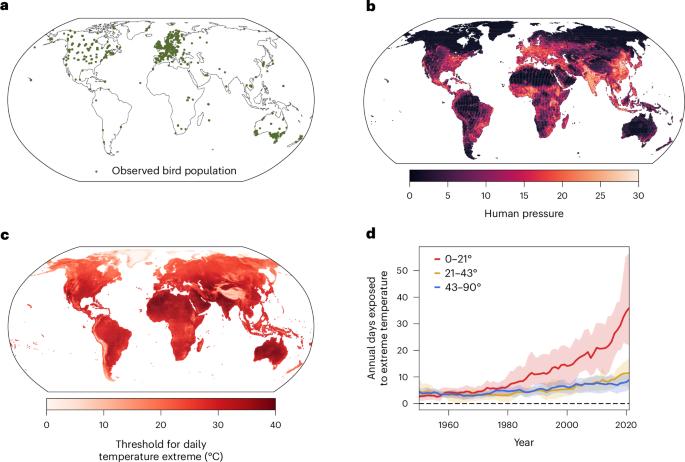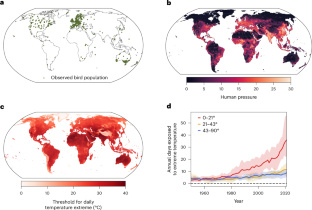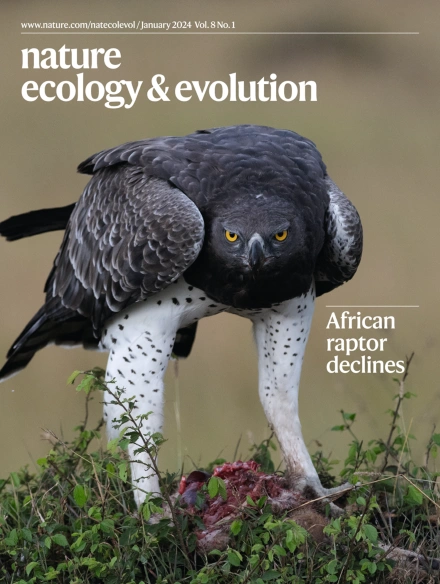极端高温加剧导致热带鸟类丰度大幅减少
IF 13.9
1区 生物学
Q1 ECOLOGY
引用次数: 0
摘要
尽管物种对环境条件表现出广泛的敏感性,但人类驱动的气候变化可能已经在多大程度上改变了它们的丰度,目前尚不清楚。在这里,我们通过将鸟类对环境条件的响应模型与气候归因框架相结合,量化了气候变化对全球鸟类种群的影响。与平均温度和降水的变化相比,我们确定了极端高温加剧的主导作用。年际极端高温暴露的增加在低纬度热带地区对年丰度增长率的降低最为强烈,在控制人类工业压力和其他长期驱动因素变化的情况下,其影响十分显著。与没有人为驱动的气候变化相比,历史上极端高温的加剧导致1950年至2020年热带鸟类丰度水平下降了25-38%。在观察到的热带鸟类种群中,气候变化的影响通常大于人类的直接压力,而在亚热带地区则相反。总的来说,这些结果展示了人类驱动的气候变化是如何重塑全球生物多样性的,并可能解释未受干扰的热带栖息地鸟类数量下降的报道。本文章由计算机程序翻译,如有差异,请以英文原文为准。


Large reductions in tropical bird abundance attributable to heat extreme intensification
Although species exhibit widespread sensitivity to environmental conditions, the extent to which human-driven climate change may have already altered their abundance remains unclear. Here we quantify the impact of climate change on bird populations from across the world by combining models of their response to environmental conditions with a climate attribution framework. We identify a dominant role of intensified heat extremes compared to changes in average temperature and precipitation. Increased interannual exposure to hot extremes reduces annual abundance growth rates most strongly in lower-latitude tropical regions, with effects robust when controlling for changing human industrial pressure and other long-term drivers. Compared to a counterfactual without human-driven climate change, the historical intensification of heat extremes has caused a 25–38% reduction in the level of abundance of tropical birds, which has accumulated from 1950 to 2020. Across observed tropical bird populations, impacts of climate change have typically been larger than direct human pressure, the opposite across sub-tropical regions. Overall, these results showcase how human-driven climate change is already reshaping biodiversity globally and may explain reported declines of birds in undisturbed tropical habitats. Climate change poses a growing threat to biodiversity, but disentangling its overall impact from other anthropogenic stressors is challenging. Here the authors use a data-driven climate attribution framework to identify a key role of heat extremes in causing changes in bird populations globally.
求助全文
通过发布文献求助,成功后即可免费获取论文全文。
去求助
来源期刊

Nature ecology & evolution
Agricultural and Biological Sciences-Ecology, Evolution, Behavior and Systematics
CiteScore
22.20
自引率
2.40%
发文量
282
期刊介绍:
Nature Ecology & Evolution is interested in the full spectrum of ecological and evolutionary biology, encompassing approaches at the molecular, organismal, population, community and ecosystem levels, as well as relevant parts of the social sciences. Nature Ecology & Evolution provides a place where all researchers and policymakers interested in all aspects of life's diversity can come together to learn about the most accomplished and significant advances in the field and to discuss topical issues. An online-only monthly journal, our broad scope ensures that the research published reaches the widest possible audience of scientists.
 求助内容:
求助内容: 应助结果提醒方式:
应助结果提醒方式:


